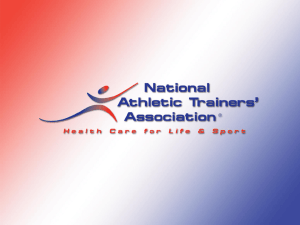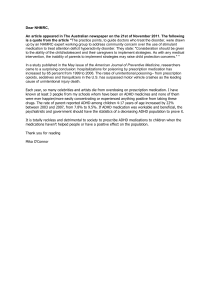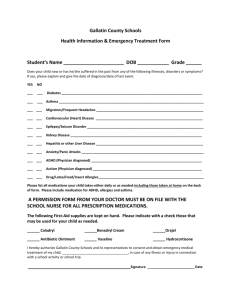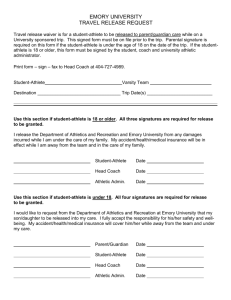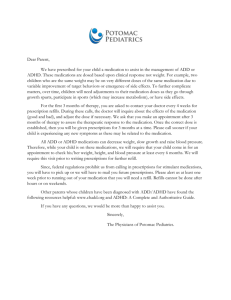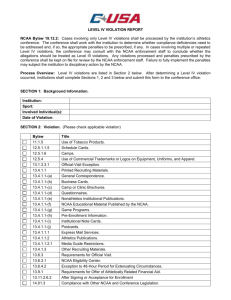Declaration of Medication Form
advertisement
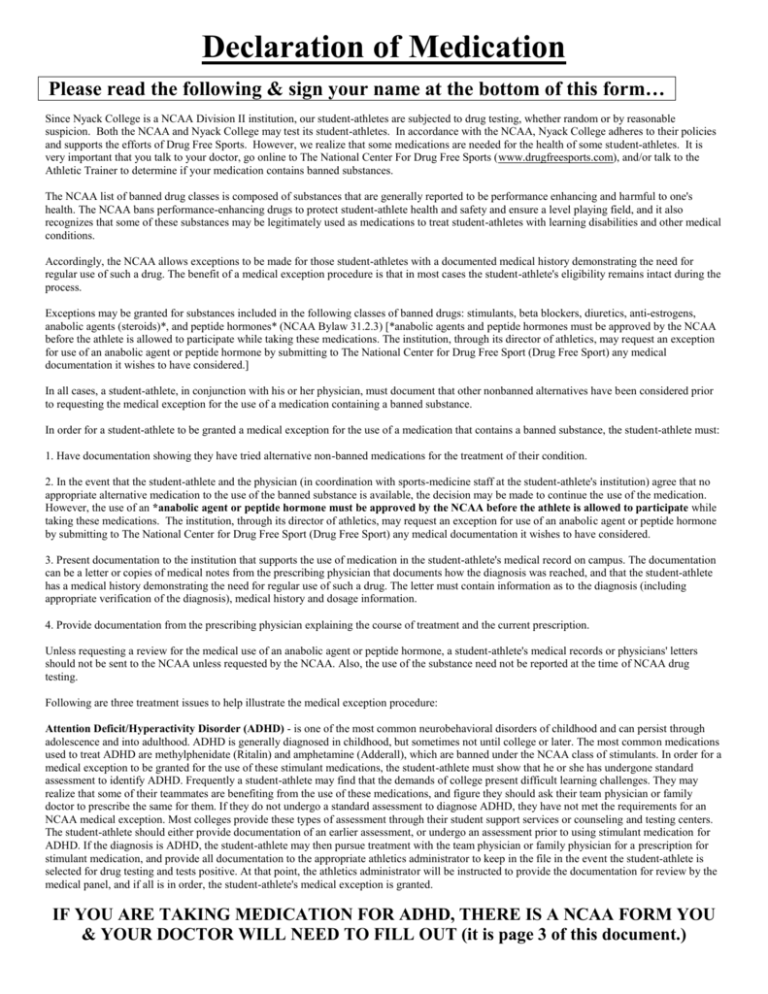
Declaration of Medication Please read the following & sign your name at the bottom of this form… Since Nyack College is a NCAA Division II institution, our student-athletes are subjected to drug testing, whether random or by reasonable suspicion. Both the NCAA and Nyack College may test its student-athletes. In accordance with the NCAA, Nyack College adheres to their policies and supports the efforts of Drug Free Sports. However, we realize that some medications are needed for the health of some student-athletes. It is very important that you talk to your doctor, go online to The National Center For Drug Free Sports (www.drugfreesports.com), and/or talk to the Athletic Trainer to determine if your medication contains banned substances. The NCAA list of banned drug classes is composed of substances that are generally reported to be performance enhancing and harmful to one's health. The NCAA bans performance-enhancing drugs to protect student-athlete health and safety and ensure a level playing field, and it also recognizes that some of these substances may be legitimately used as medications to treat student-athletes with learning disabilities and other medical conditions. Accordingly, the NCAA allows exceptions to be made for those student-athletes with a documented medical history demonstrating the need for regular use of such a drug. The benefit of a medical exception procedure is that in most cases the student-athlete's eligibility remains intact during the process. Exceptions may be granted for substances included in the following classes of banned drugs: stimulants, beta blockers, diuretics, anti-estrogens, anabolic agents (steroids)*, and peptide hormones* (NCAA Bylaw 31.2.3) [*anabolic agents and peptide hormones must be approved by the NCAA before the athlete is allowed to participate while taking these medications. The institution, through its director of athletics, may request an exception for use of an anabolic agent or peptide hormone by submitting to The National Center for Drug Free Sport (Drug Free Sport) any medical documentation it wishes to have considered.] In all cases, a student-athlete, in conjunction with his or her physician, must document that other nonbanned alternatives have been considered prior to requesting the medical exception for the use of a medication containing a banned substance. In order for a student-athlete to be granted a medical exception for the use of a medication that contains a banned substance, the student-athlete must: 1. Have documentation showing they have tried alternative non-banned medications for the treatment of their condition. 2. In the event that the student-athlete and the physician (in coordination with sports-medicine staff at the student-athlete's institution) agree that no appropriate alternative medication to the use of the banned substance is available, the decision may be made to continue the use of the medication. However, the use of an *anabolic agent or peptide hormone must be approved by the NCAA before the athlete is allowed to participate while taking these medications. The institution, through its director of athletics, may request an exception for use of an anabolic agent or peptide hormone by submitting to The National Center for Drug Free Sport (Drug Free Sport) any medical documentation it wishes to have considered. 3. Present documentation to the institution that supports the use of medication in the student-athlete's medical record on campus. The documentation can be a letter or copies of medical notes from the prescribing physician that documents how the diagnosis was reached, and that the student-athlete has a medical history demonstrating the need for regular use of such a drug. The letter must contain information as to the diagnosis (including appropriate verification of the diagnosis), medical history and dosage information. 4. Provide documentation from the prescribing physician explaining the course of treatment and the current prescription. Unless requesting a review for the medical use of an anabolic agent or peptide hormone, a student-athlete's medical records or physicians' letters should not be sent to the NCAA unless requested by the NCAA. Also, the use of the substance need not be reported at the time of NCAA drug testing. Following are three treatment issues to help illustrate the medical exception procedure: Attention Deficit/Hyperactivity Disorder (ADHD) - is one of the most common neurobehavioral disorders of childhood and can persist through adolescence and into adulthood. ADHD is generally diagnosed in childhood, but sometimes not until college or later. The most common medications used to treat ADHD are methylphenidate (Ritalin) and amphetamine (Adderall), which are banned under the NCAA class of stimulants. In order for a medical exception to be granted for the use of these stimulant medications, the student-athlete must show that he or she has undergone standard assessment to identify ADHD. Frequently a student-athlete may find that the demands of college present difficult learning challenges. They may realize that some of their teammates are benefiting from the use of these medications, and figure they should ask their team physician or family doctor to prescribe the same for them. If they do not undergo a standard assessment to diagnose ADHD, they have not met the requirements for an NCAA medical exception. Most colleges provide these types of assessment through their student support services or counseling and testing centers. The student-athlete should either provide documentation of an earlier assessment, or undergo an assessment prior to using stimulant medication for ADHD. If the diagnosis is ADHD, the student-athlete may then pursue treatment with the team physician or family physician for a prescription for stimulant medication, and provide all documentation to the appropriate athletics administrator to keep in the file in the event the student-athlete is selected for drug testing and tests positive. At that point, the athletics administrator will be instructed to provide the documentation for review by the medical panel, and if all is in order, the student-athlete's medical exception is granted. IF YOU ARE TAKING MEDICATION FOR ADHD, THERE IS A NCAA FORM YOU & YOUR DOCTOR WILL NEED TO FILL OUT (it is page 3 of this document.) Male-Pattern Baldness - Androgenic alopecia is a common form of hair loss in both men and women. In men, this condition is also known as malepattern baldness. Hair is lost in a well-defined pattern, beginning above both temples. Over time, the hairline recedes to form a characteristic "M" shape. Hair also thins at the crown of the head, often progressing to partial or complete baldness. Nonbanned medications are available to treat this condition. Finasteride (trade name Propecia), which is prescribed in some cases to treat male-pattern baldness, is a banned substance under the class of masking agents, as it interferes with the ability to identify steroid use. Before using finasteride, a student-athlete must exhaust other standard medications and document this effort. All documentation should be submitted to the sports medicine staff to review and maintain in the studentathlete's record. In the event a student-athlete tests positive for the use of finasteride, the institution will then submit the full record for a medical exception review. Hypogonadism - Or testosterone deficiency, results either from a disorder of the testes (primary hypogonadism) or of the hypothalamus or pituitary glands (secondary hypogonadism). Causes of primary hypogonadism include Klinefelter's syndrome, undescended testicles and hemochromatosis. Secondary hypogonadism can be due to aging, increasing body mass index and/or type 2 diabetes mellitus. Treatment for hypogonadism may include testosterone medication. Testosterone falls under the banned drug class "anabolic agents". A student-athlete must request approval to use medication with testosterone prior to participation while using this substance. A full medical documentation of the diagnosis, course of treatment and prescription history must be provided by the institution prior to allowing the student-athlete to compete on this medication. If a student-athlete tests positive for testosterone and has not obtained prior approval to use this substance, the case must go to appeal. If you are taking medication that contains a NCAA banned substance, it is your responsibility to obtain the documentation listed above (see page 3 for ADHD): 1. Document showing all alternative non-banned medication have been tried. 2. A letter from your Doctor stating the need for the use of the medication. 3. What the diagnosis is and how it was reached- include test results. 4. What the course of treatment is. 5. The student-athletes medical history 6. A copy of the prescription showing dosage and frequency of use. Nyack College Declaration of Medication Form If you are NOT taking any medication, both the student-athlete and the parent/guardian needs to initial the first box. If you are taking medication of any kind, please initial the second box stating “YES.” Do not initial both boxes- you must choose one or the other. Then date, print your full name- including middle name, and then sign below. Athletes Initial Parent’s Initial I am NOT taking any medication Athletes Initial Parent’s Initial YES, I am taking medication(s) Please list all medication that you are taking & if it contains a banned substance, I have obtained the required information listed above before I participate. By checking above and signing below, I acknowledge that I have read, accepted and understand, and will comply with all of the above policies and procedures. I also acknowledge that if initially I did not understand, I have contacted the Nyack College Sports Medicine Dept. to clarify any issues I did not understand and have had those issues clarified. This signed form is required prior to participation in any intercollegiate athletics at Nyack College. ___________________ DATE ___________________ DATE ___________________________________ PRINTED ATHLETE’S FULL NAME ___________________________________ PRINTED PARENT/GUARDIAN’S NAME ____________________________________ SIGNATURE OF ATHLETE ____________________________________ SIGNATURE OF PARENT/GUARDIAN*** ***Parent/guardian signature is required if the student that is claimed as a dependant &/or if medical insurance is through the parent/guardian. *** ONLY DO THIS FORM IF YOU HAVE ADHD NCAA Medical Exception Documentation Reporting Form to Support the Diagnosis of Attention Deficit Hyperactivity Disorder (ADHD) and Treatment with Banned Stimulant Medication • Complete and maintain (on file in the athletics department) this form and required documentation supporting the medical need for a student-athlete to be treated for ADHD with stimulant medication. • Submit this form and required documentation to Drug Free Sport in the event the student-athlete tests positive for the banned stimulant (see Drug Testing Exceptions Procedures at www.ncaa.org/drugtesting). To be completed by the Institution: Institution Name: Nyack College Institutional Representative Submitting Form: Name Penny W. Foland, ATC_ Email _penny.foland@nyack.edu Title __Head Athletic Trainer__ Phone _(845) 675-4780_ Student-Athlete Name: Student-Athlete Date of Birth: ____________________________________________ _______________________________ To be completed by the Student-Athlete’s Physician: Treating Physician (print name):___________________________________________________ Specialty: ____________________________________________________________________ Office address: ________________________________________________________________ Physician signature: _____________________________________ Date: _________________ Physician documentation (letter, medical notes) to include the following information: Diagnosis. Medication(s) and dosage. Blood pressure and pulse readings and comments. Note that alternative non-banned medications have been considered, and comments. Follow-up orders. Date of clinical evaluation: ____________________________ Attach written report summary of comprehensive clinical evaluation: o The evaluation should include individual and family history, address any indication of mood disorders, substance abuse, and previous history of ADHD treatment, and incorporate the DSM criteria to diagnose ADHD. Attach supporting documentation, such as completed ADHD Rating Scale(s) (e.g., Connors, ASRS, CAARS) scores. o The evaluation can and should be completed by a clinician capable of meeting the requirements detailed above. DISCLAIMER: The National Collegiate Athletic Association shall not be liable or responsible, in any way, for any diagnosis or other evaluation made, or exam performed, in connection herewith, or for any subsequent action taken, in whole or in part, in reliance upon the accuracy or veracity of the information provided hereunder. http://documentcenter.ncaa.org/msaa/saa/HealthandSafety/FormsTemplates/01052012ADHDreportingform.docx/RHB Nyack College Sports Medicine Dept. ● 1 South Blvd., Nyack, NY 10960 ● 845-675-4780 ● Fax 845-675-4771 ● penny.foland@nyack.edu
